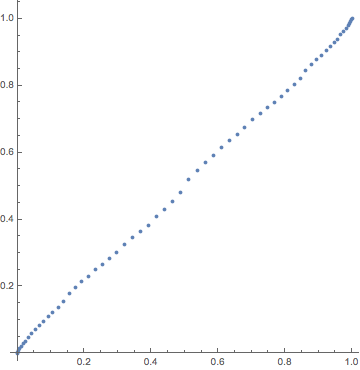Following up on Anthony Quas's post, let $g(x) = 4x(1-x)$ and $h(x) = \sin(\pi x)$. The equations $g^{(n)}(x) = 1/2$ and $h^{(n)}(x) = 1/2$ each have $2^n$ roots in $[0,1]$. If we sort those roots in order as $y_1 < y_2 < \cdots < y_{2^n}$$y^n_1 < y^n_2 < \cdots < y^n_{2^n}$ and $z_1 < z_2 < \cdots < z_{2^n}$$z^n_1 < z^n_2 < \cdots < z^n_{2^n}$, we should have $f(y_i) = z_i$.
To see that there is unlikely to be a closed form solution, note that $y^n_1$ behaves like $c_1 4^{-n}$ for some constant $c_1$ and $z^n_1$ behaves like $c_2 \pi^{-n}$. So we must have $f(y) \sim c_3 y^{\log(\pi)/\log(4)}$ as $y \to 0$. Similar arguments should show that we have $f(y^n_i+\delta) - z^n_i \sim c \delta^{\log(\pi)/\log(4)}$ as $\delta \to 0$ for every $y^n_i$ (with the constant $c$ depending on $(n,i)$). This is not how a nice function behaves!

